Wildlife filmmaker Julian Victor hails from the urban jungle of Toronto, Canada. He joined the Black AF in STEM community last year, and participated in the first ever Black Birders Week.
As #BlackBirdersWeek began trending on social media, Victor said that seeing the movement go viral was like “watching lightning in a jar.” Despite the painful events surrounding the deaths of George Floyd, Ahmaud Arbery and Breonna Taylor, Victor found a safe space in uniting with Black STEM professionals across the globe. “What has kept me going and motivated has been Black Birders Week, which highlighted the amazing work of black scientists, birdwatchers and naturalists who love and appreciate nature, but are often unseen and overlooked in the environment and conservation scene.”
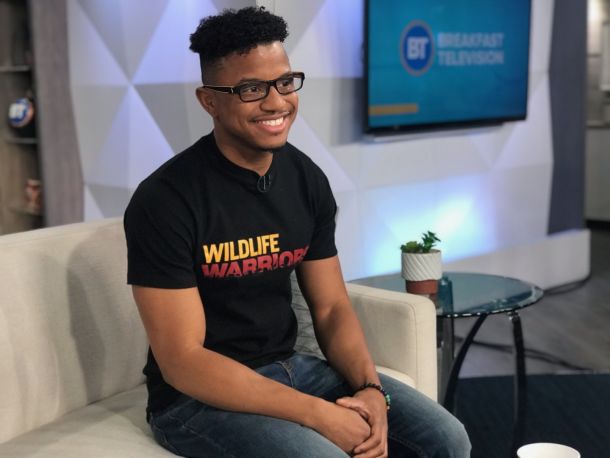
Julian Victor appeared on the Canadian morning show, Breakfast Television (BT) to dispel the myths and negative perceptions of animals that are often associated with all things scary.
It has been Victor’s lifelong dream to be a wildlife filmmaker. However, it was not until he had a powerful Black role model that he truly believed it was possible. “Seeing Obama become the first Black president, an achievement that many—including myself—thought would never happen, inspired me to take that dream a lot more seriously.” Over the course of his career, Victor has worked on projects for National Geographic TV, as well as with legendary wildlife filmmakers Dereck and Beverly Joubert. Victor currently works for Canada’s top morning show, Breakfast Television (BT). At BT Victor serves as studio floor director and has produced several segments about wildlife conservation. During our interview, which has been edited and condensed, Victor touched on why Black Birders Week has been so impactful, his journey to become a wildlife filmmaker, and what he thinks environmental organizations should be doing to help inspire the next generation.
Q: How did you get involved with Black AF in STEM? Do you have a passion for birding?
Julian Victor (JV): I came across Jason Ward, the founder of Black AF in STEM on Instagram. He was one of the few Black people that I saw that were into birding and science, and what he was doing was amazing, so I immediately sent him a message. While talking to him, he asked if I was interested in joining the community group chat, and being a part of it has been awesome. It was great to connect with other Black people in this field and have a safe space to do so.
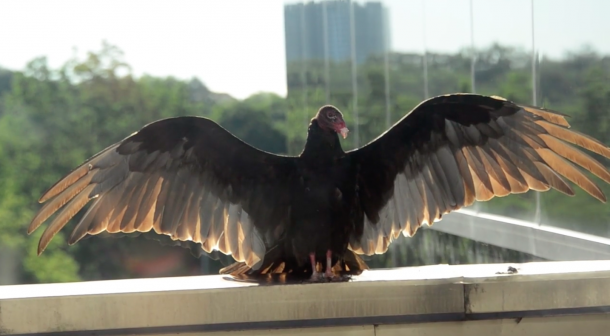
On a sunny morning in downtown Toronto, Julian Victor documented a turkey vulture spreading its six-foot wide wingspan to warm up its body. Credit: Julian Victor
I wouldn’t say I’m a birder in the way that some of the people who participated in Black Birders Week are, they’re serious birders. As a wildlife filmmaker I know certain birds. I have a lot of shots of double-crested cormorants because Toronto has the largest colony in Eastern North America. I also filmed turkey vultures perched on a building just below a busy subway station. You’d see them from the intersection. Nobody would even notice them. I thought that was so neat to see such a big bird soaring right above a busy area, no one even bothered to look up. That was really the element that excites me. Toronto is such a large, densely populated city, you wouldn’t expect to see a lot of animals. However, you would be pleasantly surprised by the amount of biodiversity that can be seen. From deer and coyotes in cemeteries, to snowy owls, arctic water birds and even bald eagles along the waterfront in the winter. You can see red foxes raising their young under busy highways and beach boardwalks in the spring, red-tailed hawks and peregrine falcons also hunt the large, pigeon and squirrel populations here. Wildlife is all around in this city, you just have to look.
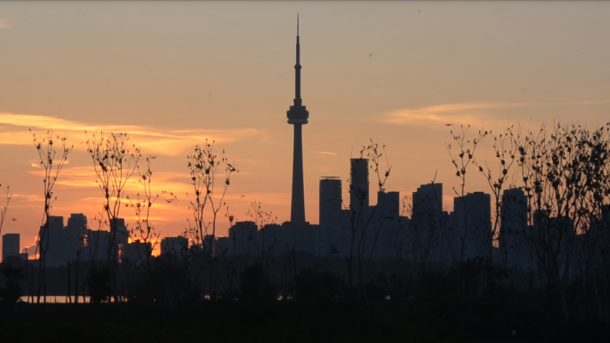
The trees along the shoreline of Toronto’s Tommy Thompson Park become a nesting ground for thousands of water birds during the late spring and summer months. Credit: Julian Victor
Q: What impact has Black Birders Week had on you?
JV: This was one of the most motivating, inspiring weeks I’ve had, especially riding off the week that we had prior. This was one of the greatest opportunities that any Black person who has had feelings like they’re the only one out there filming or birding could have. To finally see so many people talking and sharing the exact same experiences that I’ve had. It was so emotional, it was amazing I just loved it, and it motivated me and inspired me so much to see so many people doing what they love. To have Black Birders Week emerge out of something so painful, was such an amazing feeling. It just makes you feel like every time you might feel down, and you log on to social media and you see all the photos of Black people enjoying nature and talking about their experiences, it just perks you up again. What made it so powerful was that the world took notice and recognized that this community actually exists. It felt like everyone finally got the recognition that was long overdue.
Q: I read that when you saw Barack Obama become president, you were inspired to pursue your dream of becoming a wildlife filmmaker. Could you tell me more about how his win helped you focus to achieve your goal?
JV: Ten years ago I traveled to Washington D.C. with a group of Canadians to witness the historic inauguration of Barack Obama. At the time, while I always had a deep love for animals, the idea of pursuing that as a career and one day of filming for National Geographic was always a dream, but in the back of my head figured it probably wouldn’t happen. I remember at that time, after graduating from film school, the idea of getting into wildlife filmmaking was just a goal. Sure, I talked about it in school and even with some of my instructors, but they couldn’t really guide me because that area wasn’t familiar to them. As I started landing gigs in the film industry, I encountered the same thing. So, I really didn’t think it would happen because there isn’t a big wildlife filmmaking scene here in Canada, compared to the US or UK. When Barack Obama won and became president, an achievement that many thought was “the most impossible feat,” it helped me focus on my goal of getting into the wildlife filmmaking industry. I decided if I really want this to happen, I need to go hard at it and make it happen for myself because if he could become the very first Black president of the United States, what was my excuse?
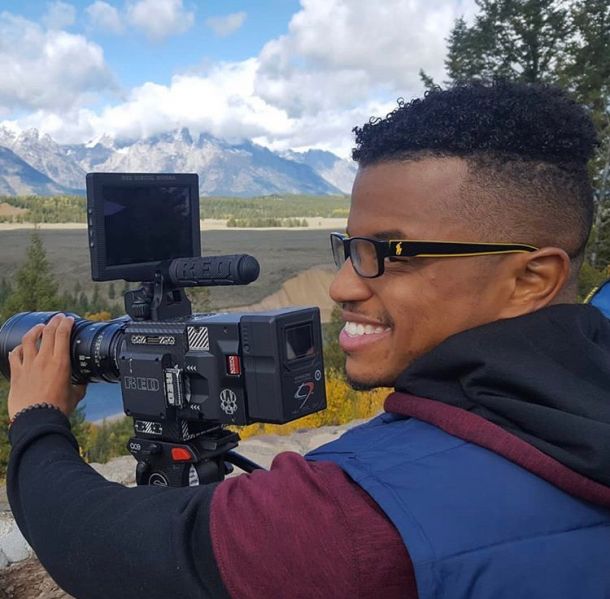
Julian Victor testing out a RED camera at the Jackson Hole Wildlife Film Festival.
Fast forward ten years later. I’ve filmed wildlife all over Toronto, which helped me get my foot in the door for a National Geographic series on urban animals. I’ve traveled to wildlife film festivals, where I met and made friends with so many amazing people that have the same love and passion for the natural world that I do. Best of all, I got to fulfil my lifelong dream of going to Africa and interning for two of the most renowned wildlife filmmakers, Dereck and Beverly Joubert, who I always looked up to. Looking back, it trips me out where I was then and how far I’ve come. As cliche as it sounds, don’t give up on your dream, whatever it may be. It might seem impossible and could take a while, but if you focus, work towards it and want it badly enough, you will eventually get it.
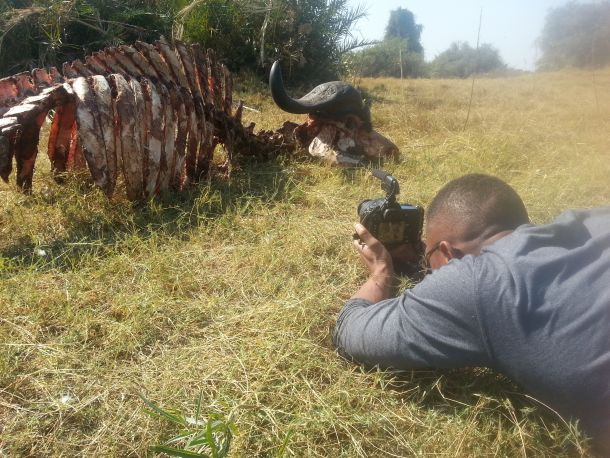
Julian Victor photographing the remains of a cape buffalo bull killed by lions in the Okavango Delta in northern Botswana.
Q: During Black Birders Week there were a lot of discussions about racism and interactions with the police, have you ever experienced any challenges or dangers when conducting fieldwork?
JV: I actually have been approached by the cops while filming. There was a year where I was filming turkey vultures, and I found some living on a suspension bridge. I was on the bridge for a few hours and two cops approached me because apparently someone called them thinking I was actually going to jump off the bridge. In that moment when I saw them approaching I thought, did I do something wrong? What’s going on? What’s going to happen here? I told them I was filming turkey vultures. At first they were like, what do you mean? Then in that moment, the turkey vulture I had been filming just flew right above us. There’s a sense that you always have to prove that you belong in certain spaces.
Due to the nature of filming wildlife you are often times by yourself. So when I’m by myself, I always have to think is someone going to approach me and ask, or believe, that a Black guy is filming nature. This gives me anxiety, especially when I have to go out and film wildlife in the early morning – in an urban area you have to think twice about how you will appear. In 2014, I was working on the National Geographic TV show “Urban Jungle: Suburbia.” I needed to get footage of raccoons crossing a road and I knew there was a prolific population on the East side of Toronto. Looking back, especially given what happened with Chris Cooper and Ahmaud Arbery, I was a Black man in a residential neighborhood, at three o’clock in the morning, just trying to film raccoons. It could have looked really sketchy, and thankfully nothing happened.
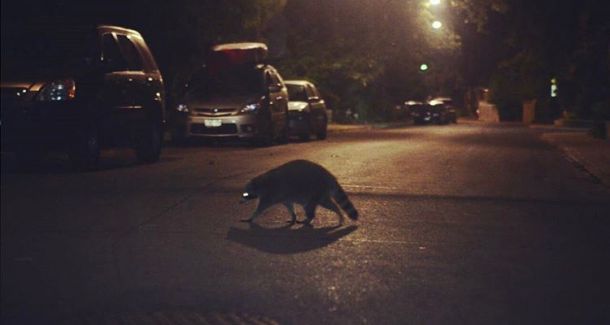
As darkness falls over the city, Julian Victor documents an urban raccoon beginning its foraging excursions. Credit: Julian Victor
I have also experienced micro-aggressions. Like when someone would say, ‘Oh, I never would have expected you to be into National Geographic.’ Well, why not? White people are never questioned when they express interest in National Geographic. But then when you don’t see people like yourself in National Geographic, it makes you question if you can do it. There are all these hosts of investigative shows, but how often do you see a Black person doing it? And it can also be a risk. If you’re going to these remote spots or locations, will people even be receptive to you because of your color? All these things play a part. Even up here in Canada people think racism does not exist, or its not as strong as it is in the States. We do have it here, it’s strong here, but they like to sweep it more under the rug. Look at the treatment of Black and Indigenous people in Canada. Canada is not off the hook and its hands are not as clean as people think they are.
Q: Are there any changes you would like to see within the sciences, and the wildlife filmmaking field to better support Black professionals?
JV: Oh yeah. One of the things companies sometimes do is they act like they’re all about diversity and they want more diversity, but then what steps are they actually taking to go into these communities and get them involved? There needs to be more outreach. Having job fairs and going to high schools and having organizations like National Geographic have these science or nature initiatives that are actually for the Black community, talking to kids and encouraging them. Even taking them on little field trips, to the marshes, or show them the ecology of the wildlife in their area. Take them out so they can actually connect with the natural world. Some of these kids don’t have the luxury of these field trips.
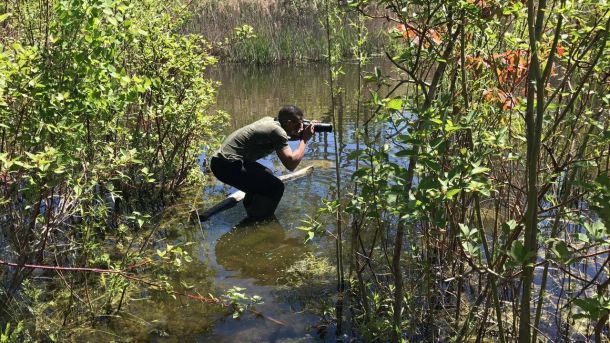
Julian Victor taking photos of urban wildlife in Toronto’s Tommy Thompson Park.
Without these kinds of engagement opportunities how is the next generation supposed to get involved? How are you supposed to make fields more diverse if certain groups are not exposed to experiences that would help them get into the field in the first place?
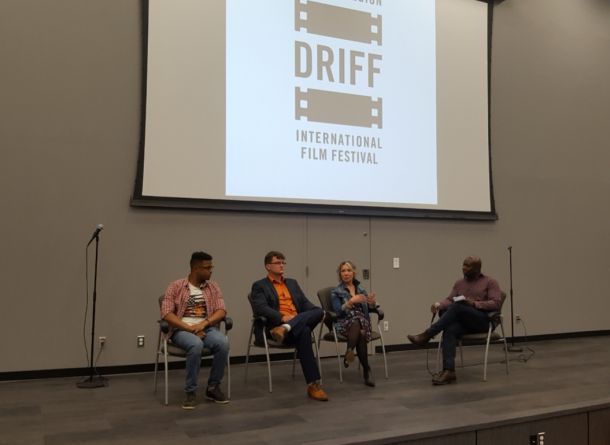
Julian Victor (far left) shared his knowledge of wildlife and conservation filmmaking with high school students at the Durham Region International Film Festival.
You don’t want to see organizations promoting diversity because it seems like the trendy thing to do. You have to make it a long-term goal and make it consistent. Don’t just look for a certain quota of people of color that you need. Especially now with the environment, we need everybody to work together to help preserve it. But how are you going to do that when a certain group of people feel like they’re always excluded from these types of initiatives or campaigns? A good example of this is what happened to climate activist Vanessa Nakate at a climate summit. She did a photo op with Greta Thunberg and three other white girls, and the news agency cut her out of the group photo. The only black climate activist in the photo. By doing that they alienated an entire group of people. For a Black kid, if you see that picture of four white women, you’re like, well, I don’t see myself. So why should I care?
That’s why I love the fact that I was able to participate in Black Birders Week because it was a great opportunity to finally showcase the work of Black naturalists and Black birders to get recognized and to spotlight issues that otherwise would have gone unnoticed. When you see all these amazing people that look like you, that are interested in the same wildlife, it was one of the greatest feelings. It was like watching lightning in a jar. What was so awesome is that suddenly so many people caught on. They became aware of what Black professionals go through just to do what they love. I think now you have the world taking notice and organizations wanting to help. So that is encouraging. I’m excited and looking forward to seeing what comes next.
